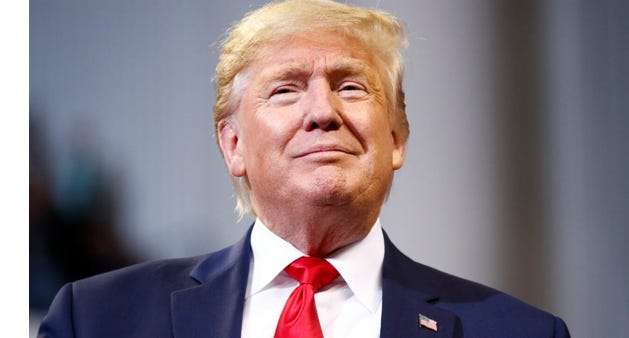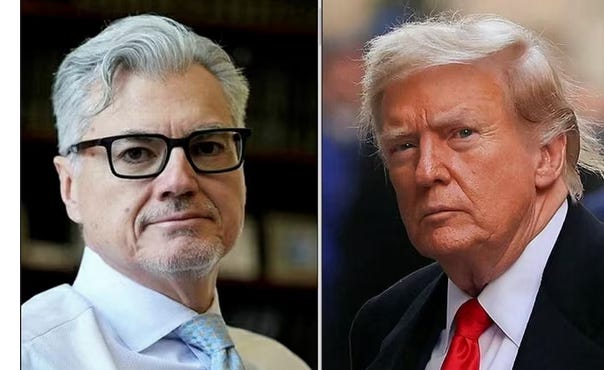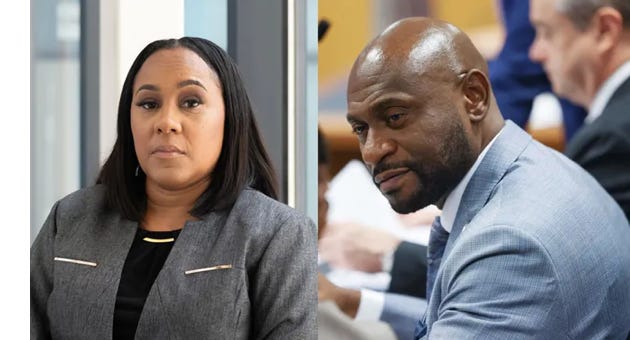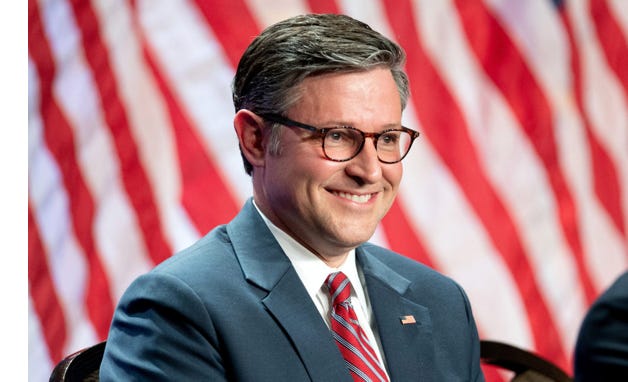Opinion
By Jeff Childers

11/19/24
Good morning, C&C, it’s Tuesday! Today we dig into two meatier issues. First, we check in on the rapidly shrinking hellscape of Trump cases, with encouraging news flowing freely. Second, I explain the astonishing rope-a-dope with which Trump —the author of The Art of the Deal— has lassoed the Senate, all but ensuring his nominees will be appointed. And lots more along the way.
🗞💬 WORLD NEWS AND COMMENTARY 💬🗞
🔥🔥 The Trump Effect is crashing into the Trump Lawfare. Yesterday, the Atlanta Journal-Constitution somberly ran a sorrowful story headlined, “Appeals court cancels hearing in Georgia election interference case against Donald Trump.” Since the election, it seems to Democrats they keep plunging through layers of Dante’s Inferno, and just when they think they’ve hit the hellish bottom, the rocky floor gives way, and they collapse into the next, hotter, even more infernal plane. Anyway, it’s more good news for President Trump.

As though we were spiritual pilgrims, let’s review the nine levels of Trump-prosecution hell. The top two layers are the two federal cases, which are being specially prosecuted by Jack Smith, an odious little demon who Supreme Court Justice Thomas opined was illegally appointed. The captive media has reported both of Smith’s cases must be closed or dismissed before Trump takes office, pursuant to a DOJ policy precluding prosecution of the department’s own boss (the President).

Passing deeper, into the third circle, where greedy, conflicted judges are tormented for eternity, we discover wispy-haired, antique Judge Engoran, who soaked Trump for a then-unpayable, historic $500 million fine — for writing the wrong value on his loan application, even though the bank testified it didn’t care. After Judge Engoran scheduled a hearing to liquidate Trump’s New York properties, Trump took his social media company public, to raise the cash to pay the massive bond. (No billionaires bailed Trump out; it happened during the long, dark night of the grim Second Act.)
Anyway, just over a month ago, the New York Court of Appeals held oral arguments on Trump’s appeal of the massive verdict, and most of the appellate judges seemed stiffly skeptical of the record-setting fine, and of the state’s creative interpretation of the law. Most observers, regardless of politics, expect Trump’s fine to be miniaturized if not completely overturned.
Moving deeper still, we discover Judge Juan Merchan, whose New York jury convicted President Trump of hiring an accountant who wrote “legal fees” on checks paid to Trump’s lawyer. Judge Merchan has twice rescheduled Trump’s sentencing hearing, now facing the hideous prospect of sentencing a sitting President to jail — which simply won’t work — or even worse, not sentencing him to jail.

The law NY used has never before resulted in a jail sentence. Trump has never been convicted of any crime, so he’s a first offender. Any jail sentence would be unwarranted. It seems doubtful to me that even a sentence of community service could stick, given the federalism issues.
Today, Judge Merchan is expected to rule on Trump’s lawyers’ motion to dismiss to case under the Supreme Court’s new presidential immunity test. My guess is that immunity does not apply since the alleged facts involving adult actresses and private lawyers don’t lend themselves to characterization as “official acts.” But I have not read the briefs.
Anyway, the Democrats are clinging to hope that Judge Merchan may come up with some creative way to corner Trump and maybe even derail his presidency. Newsweek, two days ago:

At last, we reach Democrat Hades’ lowest and most terrifying level, where the most vile and uncouth prosecutors burn eternally, consumed by scandalous flames of shame and disgrace. Although the Fulton County, Georgia RICO case carries the most serious charges, and therefore the most realistic prospect for prison, Democrats do not want to talk about it. It’s just too awful. They can’t even.
Although every Trump prosecution features shocking and bizarre legal characters obviously unsuitable to prosecute a case of undersized fish retention, must less manage the first presidential prosecution in history, no character is more shocking or bizarre to prosecute a President than Fulton County’s hapless district attorney, Fani Willis. Fani Willis, the plump county prosecutor who took orders from Biden’s White House and used the case as her personal bank account, generously spread Fulton County money around to her pals, and hired unqualified married men to work under her at the DA’s office, if you know what I mean.

Trump’s appeal sprang from the trial judge’s denial of his motion to remove Fani Willis and her office as the case’s prosecutors, basically since she’s a hopeless train wreck. If removed, the case would be reassigned to a different Georgia county, and would almost certainly be immediately dismissed. So, returning at last to the Journal-Constitution’s sad story, yesterday, the appeals court, without any prompting issued a one-sentence order canceling the already-scheduled oral arguments without explanation.
If this were one of my cases, I would interpret the highly unusual cancelation of oral arguments as a very encouraging sign. Appeals courts routinely allow oral argument even in clear-cut cases, out of respect to the parties and their lawyers, even if they have no need to ask the lawyers any questions. Appeals courts only deny oral argument when the outcome is so obvious that oral arguments would certainly be useless, so obvious it would just embarass one side or the other.
To set oral arguments and then cancel is extremely rare. So the clear message here is: we have already decided and we don’t need to ask the lawyers anything.
Obviously, we cannot know for sure. But since criminal defendants are usually given priority in appeals, and since this criminal defendant is an elected President, he would normally (even if unfairly) receive heightened priority. The appellate judges would almost certainly go through the motions of oral argument if only to demonstrate their lack of bias.
So here’s my guess: the appellate court could be preparing to throw out the entire case, perhaps on a theory of federal pre-emption, because states are not allowed to prosecute sitting federal officials. Or something like that.
One of my mentors always used to say that appellate judges have a dusty old toolbag filled with ancient “doctrines” and “principles” — tools — going back thousands of years of common law. Whenever an appeals court needs to do something extreme, or unexpected, they just magically whip out and dust off whatever archaic tool or doctrine they need to achieve the necessary, and voilá!
All the Trump cases are rapidly unraveling. But we will never forget them.
🔥🔥 Social media has been consumed lately with laborious and often overwrought discussions about whether the Senate will or will not quickly approve President Trump’s nominations. Some worry the Senate will tie the President up in red tape, causing months (or even years) of delays, which is exactly what it did in 2016 after he was elected to his first term. Trump has learned a lot since then. Yesterday, the Atlantic ran an unintentionally encouraging story headlined, “How Trump Could Make Congress Go Away for a While.” If only. The sub-headline explained, “An untested provision in the Constitution might allow him to install his Cabinet picks no matter what the Senate has to say.” It’s really good. And, it’s about to be Mike Johnson’s time to shine.

It’s not any stretch to say the GOP’s Senate RINOs are concerned about some of Trump’s nominations, or maybe even most of them. The first principle is that the Constitution requires Presidential nominations to be confirmed through a yes/no vote by a majority of Senators. As noted, at the outset of Trump’s first term, the Senate tied Trump’s appointees up in knots and put them through the wringer in ugly, extended, contentious hearings. (Note for interest that Senate hearings to ‘interview’ nominees are a relatively recent innovation and are not constitutionally founded.)
There exists a long and storied history of Presidents skirting the Appointments Clause, sometimes for good and necessary reasons, occasionally for ill. As a result, a respectable amount of Supreme Court law has developed, so despite what the Atlantic says, the available alternatives can hardly be called “untested.”
The Constitution, mindful of the need for steady leadership, provides a second way for Presidents to hire Cabinet nominees: the Recess Appointments Clause. When the Senate is in recess, the President can appoint a Cabinet member until the following Senate term. No Senate consent is required. During previous battles over presidential recess appointment powers, the Supreme Court has ruled that recess appointments are not lessor or inferior in any way to Senate-confirmed appointments.
The Constitution does not discriminate between the two types of Appointments.
Knowing all about the Presidential Recess Appointment Power, the Senate hardly goes into recess, at least not in the modern era. The Senate is institutionally more powerful whenever it can hold appointment powers over a president’s head. Wielding the appointment power, the Senate can haggle for things it wants from the Oval Office, like presidential signatures on bills, for one obvious example. Recessing thus throws away its leverage.
So if Trump will face problems in the new Senate —which is hardly certain— it is difficult to imagine the Senate would voluntarily recess to allow Trump to quickly appoint his nominees. It’s not impossible, though. Incoming Senate majority leader, John Thune (R-S.D.), did say that “all options are on the table, including recess appointments.” The real question is, what horrible promises might the Senate wring from Trump, in exchange for agreeing to recess?
This is where things get especially interesting. There’s an offbeat, never-used constitutional provision that, combined with Recess Appointment powers, when the presidential stars are aligned in just the right way, provides a President with a powerful tool: the right to force the Senate into recess. Even though never used, the Supreme Court has considered exactly this scenario, and not very long ago, either.
In 2014, the Supreme Court decided NLRB v. Noel Canning. Amidst an extended discussion of Appointment Powers, the majority opined that “the Constitution gives the President (if he has enough allies in Congress) a way to force a recess.”
The Constitution’s Article II, § 3, provides that “The President may, on extraordinary Occasions, convene both Houses, or either of them, and in Case of Disagreement between them, with Respect to the Time of Adjournment, he may adjourn them to such Time as he shall think proper.”
In modern language, the President can force both the House and Senate to adjourn whenever one of them passes a resolution to recess and the other doesn’t. A presidentially forced recess can last as long as the President wants. So, for instance, if the House of Representatives tells the Senate it wants Congress to recess, and the Senate “disagrees,” then the President may declare a recess to settle the disagreement.
For as long as he wants.
Circling back to the beginning, all this places Trump ally and House Speaker Mike Johnson in the spotlight. Trump may not even need to use his disagreement powers. The existence of a threat of an extended recess completely changes the dynamics. President Trump now holds effective negotiating leverage to strike a rational deal with the Senate, without having to dicker away the MAGA farm.
That is terrific, reassuring news. There is no need to panic when turtle-like, vaccine-injured relic and Senator Mitch McConnell says stuff about Trump’s nominees. Trump holds the cards he needs to make a deal. But there’s an even better way of looking at it.
This appointment strategy is wickedly smart. It took everyone by surprise. It evidences a stratospheric level of planning and master-level chess-playing by the Trump Team. Trump is getting some of the best legal advice I have ever seen. No wonder he is being so bold in his nominations, as if he’s not giving a single thought to the political considerations of nominating people that a majority of the Senate will go along with.
In a Fox News interview on Sunday, Speaker Johnson refused to rule out helping Trump evade the Senate. “There may be a function for that,” he said suggestively. “We’ll have to see how it plays out.”
In other words, Trump doesn’t need the Senate. He has Mike Johnson and the House of Representatives in his pocket. And since the Senate knows it, President Trump probably won’t even have to play his ace cards. For an even more mind-blowing experience, cast your mind back over the last four years, and recall how hard Trump has worked to get into this position of having a friendly Speaker and a MAGA Congress.
And that, dear friends, is why the Atlantic, slowly awakening to the danger, is panicking.
If Trump was a babe in the woods when in 2016, as a rank amateur, he set out to confirm his first term picks, this time he’s a grizzly bear in the Congressional woods. What other cards does Trump have up his sleeve?
Have a terrific Tuesday! Coffee & Covid shall return again tomorrow with another roundup of essential news and commentary.
Don’t race off! We cannot do it alone. Consider joining up with C&C to help move the nation’s needle and change minds. I could sure use your help getting the truth out and spreading optimism and hope, if you can: ☕ Learn How to Get Involved 🦠
Twitter: jchilders98.
Truth Social: jchilders98.
MeWe: mewe.com/i/coffee_and_covid.
Telegram: t.me/coffeecovidnews
C&C Swag! www.shopcoffeeandcovid.com
The views expressed in this commentary are those of the author and do not necessarily reflect the official position of Citizens Journal Florida









